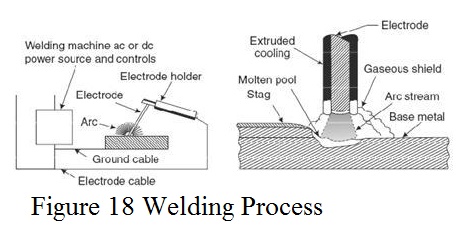Chapter: civil : Design Of Steel Structures
Welding Process

When two members are connected by
means of welds, such a connection is known as welded connection. Welding offers
an opportunity to the designer to achieve a more efficient use of the
materials. Earlier designers considered welds as less fatigue resistant. It was
believed that attaining good welds at site is impossible. Now a day, with the
advances in the field of non destructive testing methods (NDT), testing and
quality control of welds became easier. This gives the designers enough courage
to explore the possibilities and capabilities of welded connections. Speedy
construction is facilitated by using welded connections. Weight of welded
connections is relatively low and hence cuts cost of construction. Since there
is no reduction of holes the gross cross section is effective in carrying
loads.
WELDING PROCESS
Welding
consists of joining two steel sections by means of metallurgical bond between
them by the application of pressure and/or fusion. The most commonly used
welding process is fusion process. The bond is produced, in fusion process, by
melting the surfaces to be joined and then allowing them to solidify in to a
single joint. The most commonly used welding process is the arc welding process
(Figure 18). In this process intense heat required (around 36000C)
to melt the steel sections is produced by an electric arc. The tremendous heat
at the tip of the electrode melts the base metal and the filler metal to form a
pool of molten metal called crater which solidifies on cooling produce the
joint required.
Related Topics